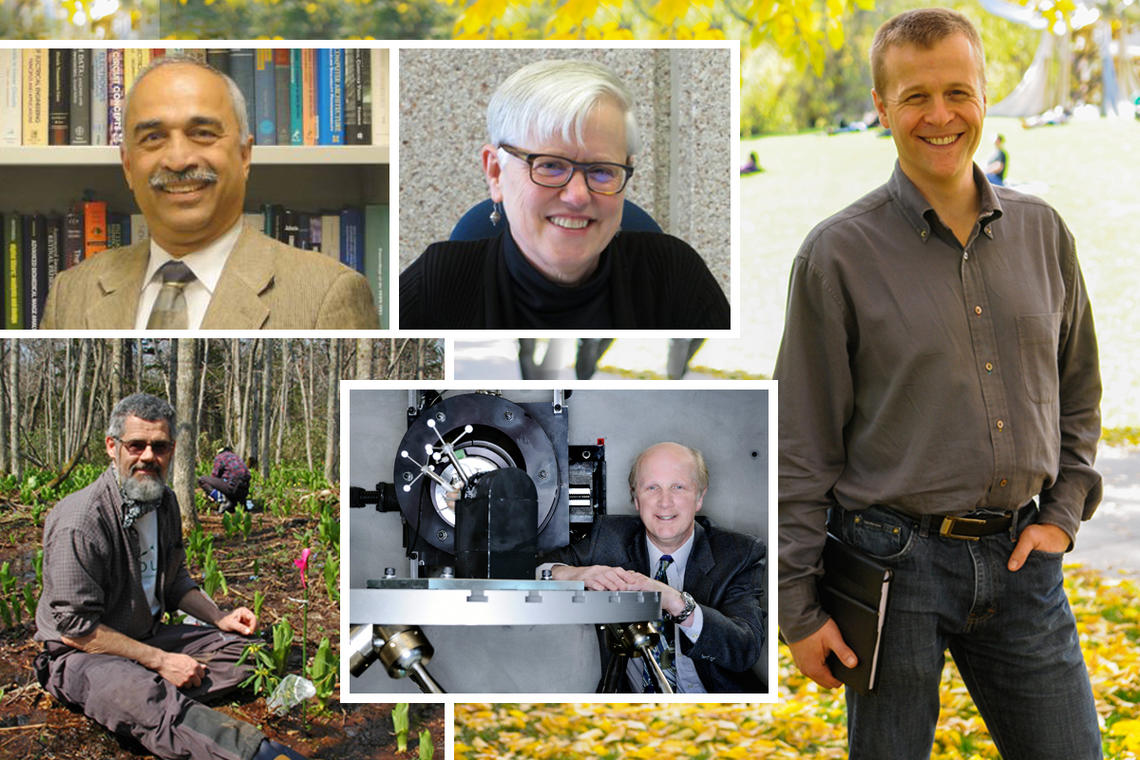Sept. 9, 2016
Five UCalgary scholars named New Fellows of the Royal Society of Canada

From top left: Rangaraj M. Rangayyan, Susan Bennett, Christian BöK, Nigel Shrive and Lawrence Harder
The Royal Society of Canada announced the 2016 New Fellows in Ottawa on Wednesday. Five University of Calgary scholars, from a range of backgrounds, will be inducted into this league of prominent intellectuals at a ceremony in Ontario on Nov. 18.
“Election to the academies of the Royal Society of Canada is the highest honour a scholar can achieve in the arts, humanities and sciences,” notes Elizabeth Cannon, president and vice-chancellor of the University of Calgary, who is also a fellow of the Royal Society of Canada. “We celebrate their dedication and the deep contributions they are making to their fields, while also looking forward to all that they will continue to contribute, not only on behalf of our university, but on behalf of Canada.”
The five nationally recognized scholars include award-winning author Christian BöK, from the Faculty of Arts, who has been recognized for his influential exploration of language and his novel use of scientific methods to create poetry. Also from Arts, Susan Bennett has been recognized for her work that challenges the way we perceive performance in its sociocultural contexts. Biomedical engineer Rangaraj M. Rangayyan from the Schulich School of Engineering has been awarded for his contributions that include authoring textbooks that are in wide use around the world and the development of biomedical diagnostics for breast cancer and joint degeneration. Nigel Shrive, also from the Schulich School, has been recognized for his contributions in both civil and biomedical engineering, including six patents, two books, 14 book chapters and more than 400 papers. And from the Faculty of Science, ecologist Lawrence Harder has been recognized for his work that integrates ecological and genetic perspectives on plant-pollinator interactions. His work has had worldwide impact for clarifying the nature of pollination problems confronting global agricultural production.
The UCalgary scholars are part of a cohort of 89 new fellows from across Canada who will be inducted into the academies in November. The scholars have been elected by their peers — in recognition of their outstanding scholarly, scientific and artistic achievements. After this new cohort has been formally inducted, there will be 67 active fellows at the University of Calgary.
Founded in 1882, the Royal Society of Canada comprises the academies of arts, humanities and sciences; in addition to Canada's first national system of multidisciplinary recognition for the emerging generation of Canadian intellectual leadership, The College of New Scholars, Artists and Scientists. Its mission is to recognize scholarly, research and artistic excellence, to advise governments and organizations, and to promote a culture of knowledge and innovation in Canada and with other national academies around the world.
University of Calgary 2016 New Fellows:
Division of Arts
- Christian BöK: Department of English, University of Calgary
Christian Bök is an experimental poet in Canada. Recognized internationally as a very influential writer, Bök explores the music of language, often using scientific mechanisms to create poetry. His book Eunoia (2001), the bestselling book of Canadian poetry, won the Griffin Prize in 2002. His most recent work, The Xenotext (2015), contributes not only to poetic practice, but also to molecular biology and cellular genetics.
Division of Humanities
- Susan Bennett: Department of English, University of Calgary
Innovative and theoretically sophisticated in its approach, Susan Bennett’s work in the areas of theatre and performance studies has challenged the ways scholars and practitioners perceive performance in its sociocultural contexts. In her career, she has steadfastly underscored the social capital of the humanities and documented the need for renewed creativity in the arts across Canada.
Academy of Science
- Rangaraj M. Rangayyan: Professor Emeritus, University of Calgary
Rangaraj M. Rangayyan has made substantial contributions to biomedical engineering and computer-aided diagnosis. His books are used at several universities for research and teaching, and have been translated to Russian and Mandarin. With collaborators, he has developed several techniques for detection of abnormalities in biomedical signals and images, including breast cancer and degeneration of knee-joint cartilage.
- Nigel Shrive: Schulich School of Engineering, University of Calgary
Nigel Shrive is internationally known and respected, in both civil and biomedical engineering, for his theoretical contributions, ingenious testing, real-world applications and development of novel testing equipment. His research has resulted in significant impacts on the fields of masonry and concrete, joints and tissues, and the cardiovascular system. His work has resulted in six patents, two books, 14 book chapters and more than 400 papers.
Life Science Division
- Lawrence Harder: Faculty of Science, University of Calgary
Lawrence Harder has exposed new perspectives on the ecology and evolution of angiosperm reproduction. His theoretical and empirical research illustrates the contribution of plant-pollinator interactions to the diversity of flowering plants, reveals inflorescences, rather than individual flowers, as the fundamental unit of plant mating, and integrates ecological and genetic perspectives on plant mating. He has also clarified the nature of pollination problems confronting global agricultural production and identified principles for improved agricultural practice.
